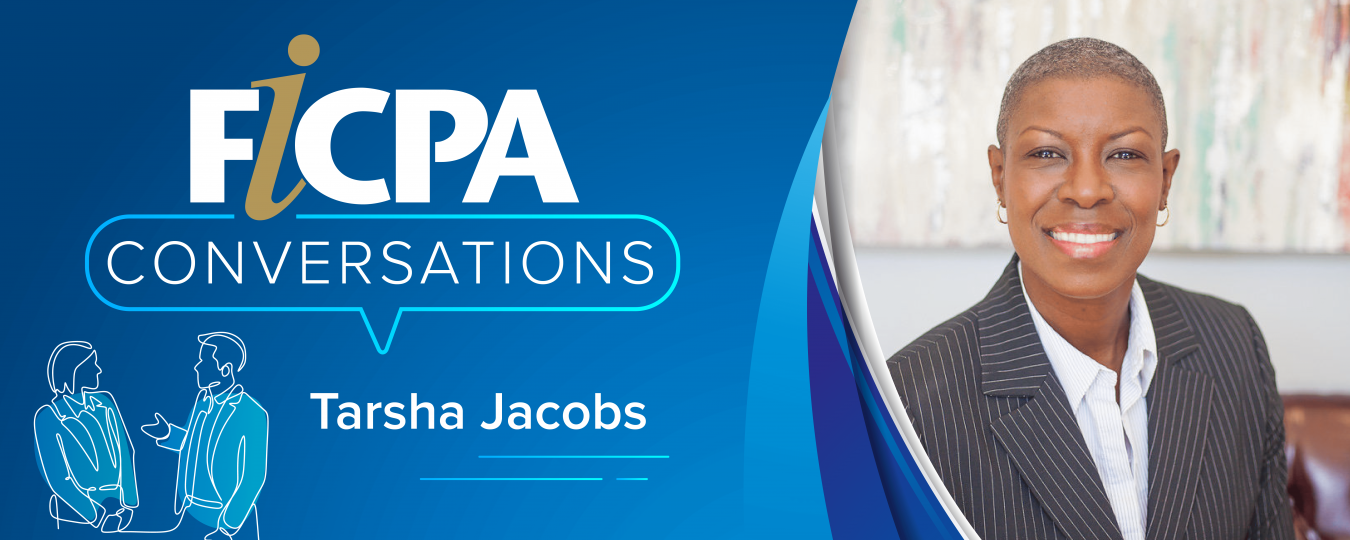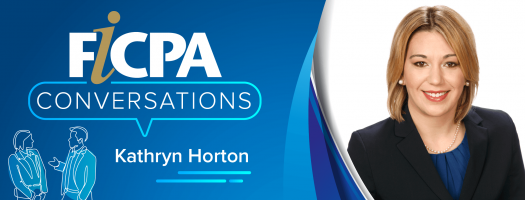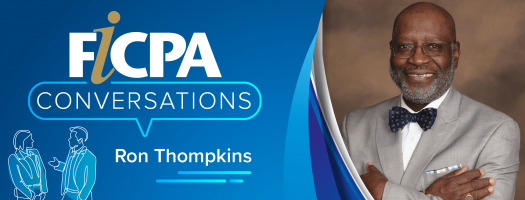
We continue our Conversations series with an individual who has impacted at the FICPA at every possible level.
Tarsha Jacobs has served on the FICPA’s Board of Directors and Council. She’s chaired the Central Florida chapter, the Women’s Leadership Committee, the Accounting Careers Committee and been involved with the FICPA Scholarship Foundation.
“Sometimes I have to look at my CV to remember everything I’ve done,” she jokes.
A lifelong resident of the Orlando area, Jacobs now owns and operates her own firm, Tarsha R. Jacobs, CPA, PLLC, when she isn’t mentoring, or teaching test prep, or teaching yoga, or training for triathlons.
We discussed her role on the FICPA’s Diversity and Inclusion Task Force, her passion for physical fitness, and her journey from navigating college as a single mom to becoming a leader in her industry.
Here’s Tarsha’s story:
Tell us a little bit about your path as a CPA, from where you started to how you wound up wearing so many different hats with the FICPA.
I took my first accounting course in high school and loved it from the beginning. I knew this is what I wanted to do. I was a single mom in college and had to work full-time, so I identify with those students who are not the traditional student, who have to work their butts off like I did. I graduated from UCF in 1993 and went to work right away with Blue Cross Blue Shield in Central Florida to provide for my son. Later on, I went back to school – I had a goal to get my master’s before I turned 30 – and I got my MBA from the University of Phoenix in 2001. I returned to UCF to take additional courses, had a second child, went through the Becker review program – that’s why I’m a Becker teacher now – and finally took the CPA exam in 2004. That’s when I entered public accounting.
I went to BKHM CPAs and started as an audit senior and worked my way up to senior manager. I had only done healthcare to that point, so this is when I got a little more experience in other areas, including not-for-profit work, which I still do a lot of.
After working there about eight years, I made a tough decision about whether I wanted to start something of my own. I looked at my family history; we had a history of entrepreneurs there, of people owning their own businesses and being their own boss. I thought: “This is a good thing for me. It’s a legacy.” I decided to make that jump, it’s been eight years, and I have not regretted it for a single moment.
You’re a member of the FICPA’s newly created Task Force on Diversity and Inclusion. What are your hopes for what the committee can accomplish, and why was it important to you to take a leading role in the effort?
Having been in accounting for all these years in different positions, I definitely see the need for more diversity. I think back to a time when I went to an office for an audit, and I was in a room that was all-male, all-white and all-older. There just weren’t a lot of people in the profession who looked like me. I think it’s important for people to reach back and bring information to the next generation, and when companies don’t have diversity in their offices that mirrors our society, they’re missing out on a great deal of talent. That’s the diversity part.
When it comes to inclusion, it’s important to me not just to have a seat at the table but also to have a voice. It’s been a passion for me to try to share my career with others, giving back and mentoring.
We may not always meet our goal in having everyone embrace diversity and inclusion, but we can at least get our message out there about the benefits of having a diverse workforce and taking advantage of the expertise and different viewpoints people may have. I’m hoping, as part of the task force, to bring my experience to the table. It’s not just work experience but life experience – how I felt being the only person of color or the only woman in the room. It’s about empowering the next generation to stand up and a have a voice, to not be shy about speaking out about injustice or sharing your opinion.
You’ve mentioned some of the not-for-profit work and mentoring you do. You’re also involved with a group called “Black Girls Run.” Beyond how involved you are in the accounting profession, can you underscore the value of giving back and being a leader in other ways? In this case, why mentoring, and why fitness?
I’m now a mentor because of what mentors brought to my life and my career. I think sometimes we get bogged down in thinking there has to be a formal program, but I encourage young people to seek out a mentor, someone you admire. And it doesn’t always have to be career-related; it can be about life. Mentoring has been important for me as a leader, as a CPA, as a wife, as a mother, as a Christian. Having access to people who have been through something before is so important in terms of navigating the things you’re going to encounter in life.
In terms of physical fitness, it’s been something I’ve been really passionate about for the last 7-8 years. For me, it took getting to the point where my weight was an issue; you look in the mirror and you see a person you don’t recognize. Once I got to that point, I started slow and began to have a lifestyle around fitness. I didn’t just want to lose weight, have it come off, and then gain it again; I really made it a lifestyle.
I found “Black Girls Run” just by going to a race and meeting a few of the ladies and talking about what they do. The organization was started 10 years ago by a group of women who saw so much health disparity in the black community. Higher rates of obesity, high blood pressure, diabetes – all these things are weight and health-related. Joining that group has established a love for running I never thought I would have and led to me doing triathlons. That was about challenging myself to do something new. About three years ago, I became a triathlete and learned how to swim, which I had never done. A lot of people in the black community can’t swim; I don’t know why, but it’s a stigma. Then I got into yoga and actually became a certified yoga instructor.
It’s a passion of mine. Our health is important, and we can take it for granted.
This is less of a question and more of an observation, but you seem like you’re a very busy person. It’s impressive.
[Laughs] I get teased all the time. People ask where I get the energy. I teach yoga three or four times a week, but to me that’s renewing. It’s regrouping. It’s all about stretching your body and allowing your muscles and joints to recuperate. I don’t even consider that work.
Since it is Women’s History Month, and since you are a past chair of the Women’s Leadership Committee, I’m curious about what the industry could still do better in terms of welcoming and supporting female CPAs. Is it fair, based on what we’ve already discussed in terms D&I, to link the strides women have made as part of a larger story of advancement in accounting?
I think that’s true. Hand in hand with women getting into leadership roles, there’s been additional progress. But I still think there is a lot of room to grow. For me, not just as a woman but as an African American woman, I go into a lot of rooms and businesses, and there’s still not a lot of black women in those circles. It’s great to see people shattering ceilings and women stepping into leadership roles, because it gives the next generation the belief that, “This is something I can do.”
It’s one of things I discussed in my article for Florida CPA Today last summer: As African Americans or as minorities, we celebrate the “first” a lot, because in 2021 we’re still having the first African American or first woman in a given role, whether it’s in the military or accounting or heath or whatever. It’s taken this long for us as a society to begin to catch up, for those doors to be open and opportunities to be available to minorities.
There’s been a lot of progress, but there’s more to do when it comes to making sure women and African Americans and other groups of underserved and overlooked people have a voice and a place. That they can enter into these circles and be themselves. That’s the other thing – that they can be authentic and accepted. That is something we still struggle with.
Sometimes it can be hard to believe that one person can make a difference, and that line of thinking can be discouraging. You don’t seem like you succumb to that at all. What kind of advice do you give – whether it’s as a mentor or a family member or a colleague – to convince people of all they’re really capable of?
Take advantage of the opportunities you have as you interact with the next generation and as you step into positions of authority. Take those opportunities in your company or your circle of influence to really be thoughtful – and strategic. Sometimes things won’t be at the forefront of your mind when it’s not an issue that really affects you, so it’s about opening your eyes to what impacts the people around you and what the plight of others might be.
Be strategic in your thinking: “How can I help? How can I make this situation better? How can I improve my company? Are we really promoting diversity and inclusion, or are we just talking about it? Are we just saying we have programs, or are we really embracing this effort?”
Even if you can reach out to someone in your day-to-day life – whatever you’re passionate about – if you can make a difference in their life, maybe they can pass it on to the next person. To sit back and say, “I’m just one person,” you can always affect change. You can be the one who makes change wherever you are, in your own circle of influence.

